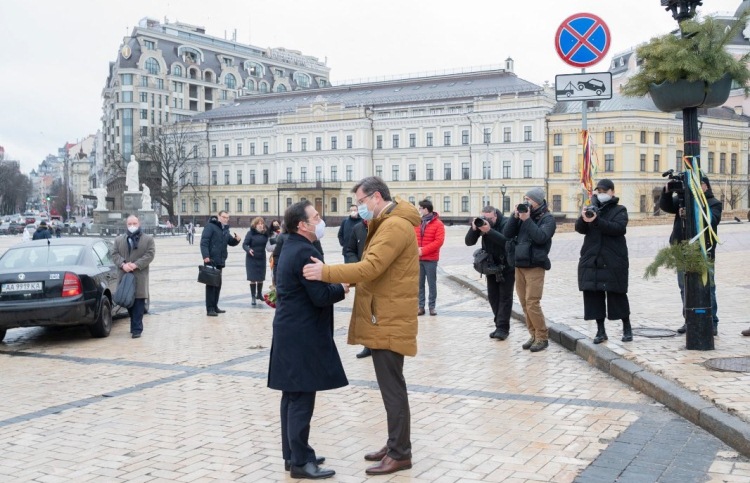The Diplomat
The Minister of Foreign Affairs, José Manuel Albares, avoided yesterday in Kiev any reference to the possible shipment of Spanish weapons to Ukraine because “this is the time for diplomacy and not to open scenarios and hypotheses that are not there”.
Albares was received in Ukraine by the President, Volodimir Zelenski, and the Prime Minister, Denis Shmyhal, and participated in a floral offering at the Memorial Wall to the soldiers fallen in the war. He also held an interview and a press conference with Foreign Minister Dmytro Kuleba, during which the head of Spanish diplomacy reaffirmed Spain’s support for “the sovereignty and territorial integrity of Ukraine” and assured that the Government of Pedro Sanchez is ready to work in a coordinated manner within the EU to implement a comprehensive package of measures, in particular new sanctions, to deter Russia from further aggression.
“The position of Spain and the EU is clear: we are working for a scenario in which any differences are resolved through dialogue, a dialogue that gives way to de-escalation, and for that a de-escalation is necessary at this time,” Albares said during the press conference. Therefore, “this is the time for diplomacy, not to open scenarios and hypotheses that are not there,” he stated in response to journalists’ questions on whether Spain, as other countries have done, is considering sending arms to Ukraine in the face of the risk of invasion by Russia.
“No one is preparing for war on this side of Europe,” Albares assured. “We follow with concern the deployment of troops, but this situation must be addressed through diplomacy” in the appropriate forums, such as the EU, NATO or the OSCE, because what is at stake is “safeguarding the principles on which international law is based: sovereignty, the territorial integrity of states and the prohibition of the use or threat of use of force.”
For his part, Kuleba, who briefed Albares in detail on the security situation near the border and in the territories of Ukraine occupied by Russia, assured at the press conference that “the situation remains tense but is under control” because “diplomacy continues to work to reduce tensions.” “It is important for everyone to realize that this is not only a threat to the security of Ukraine, but also to the whole security architecture of Europe. The future of Europe and of each individual European country will depend on how the greater European community overcomes this crisis,” he warned.
As reported by the Kiev government, the two ministers paid special attention to strengthening Ukraine’s defense sector and capabilities and discussed Ukraine’s European and Euro-Atlantic integration, as well as the upcoming NATO Summit to be held in Madrid in June. Albares and Kuleba also agreed to hold regular political consultations between the Ministries of Foreign Affairs of the two countries and the next meeting of the Ukrainian-Spanish Joint Intergovernmental Commission for Economic and Industrial Cooperation. The Spanish minister also supported Kuleba’s proposal to hold a bilateral business forum.
Albares’ visit to Kiev coincides with a time of greatly intensified diplomacy to try to reduce tension between Russia and Ukraine. Last week, Ukraine received visits from the prime ministers of the United Kingdom, Boris Johnson; the Netherlands, Mark Rutte; and Poland, Mateusz Morawiecki; and Kuleba himself held a telephone conversation with U.S. Secretary of State Anthony Blinken on Friday. Kuleba also received German Foreign Minister Annalena Burbock on Monday, and French President Emmanuel Macron visited Kiev on Tuesday to meet with President Zelenski, just a day after holding a five-hour meeting in Moscow with Russian President Vladimir Putin. The foreign ministers of the Czech Republic, Jan Lipavsky, Austria, Alexander Schallenberg, and Slovakia, Ivan Korchok, also visited Ukraine this week.
After his visit to Kiev, Albares travelled yesterday to Lyon, France, to participate in the double meeting of European foreign and health ministers, convened by the French Presidency of the EU. During this meeting, French Foreign Minister Jean-Yves Le Drian briefed his EU-27 colleagues and EU High Representative for Foreign and Security Policy Josep Borrell “on Emmanuel Macron’s discussions in Moscow, Kiev and Berlin to achieve de-escalation, including in the framework of the Normandy Format,” Le Drian himself reported on his Twitter account. The Normandy Format is a framework for dialogue between Ukraine, Russia, France and Germany that emerged after the Russian annexation of Crimea in 2014. Albares travels to Brussels today to meet with NATO Secretary General Jens Stoltenberg and Josep Borrell.







